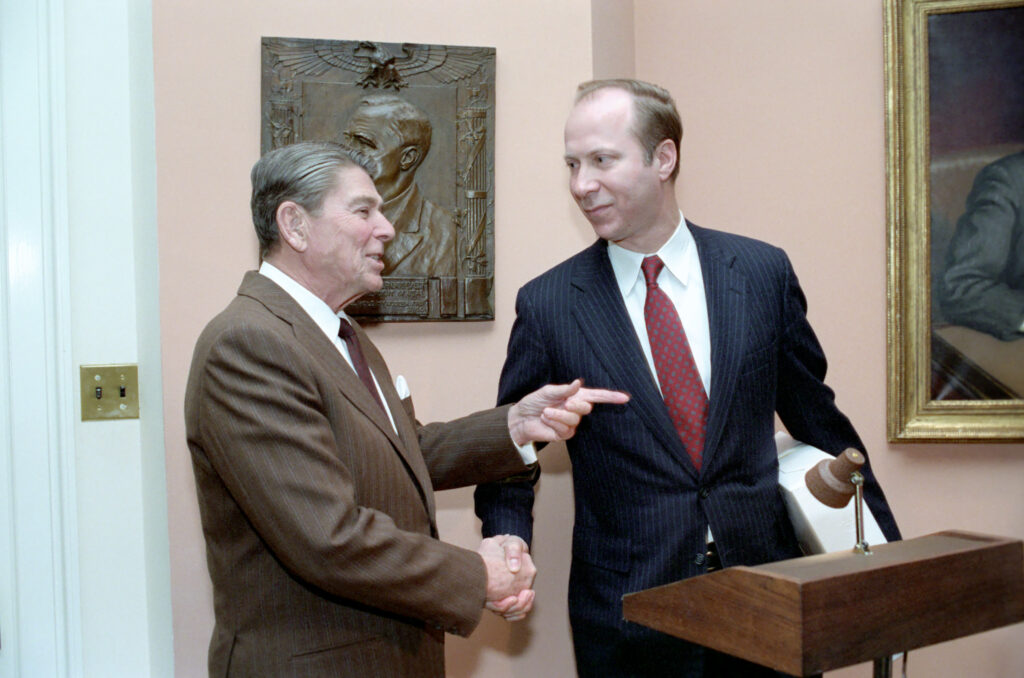

By Ted Slafsky
I usually devote this column to the 340B program or other prescription drug pricing issues but this month will be different. Late Friday, I got the news that David Gergen, my first boss out of college and an important mentor to me and countless others, passed away.
David was a senior adviser to four U.S. presidents and understood the importance of bipartisanship. I was very lucky to work for him at U.S. News & World Report for close to four years and to call him and his wife, Anne, longtime friends.
Despite his 6-foot-5-inch frame, low distinctive voice and almost royalty status in Washington, DC, David was not intimidating at all. David was a true southern gentleman. As his daughter, Katherine, a primary care doctor at one of the first hospitals to enroll in the 340B program, put it in an eloquent tribute last year as her father struggled with Lewy body dementia, “he was a gentle giant.”
David represented an era that is difficult to find these days in Washington: someone who felt comfortable spending time and working for key decision makers from both political parties.
David grew up in Durham, N.C., and his father was chair of the math department at Duke University. He spent his summers in college working for then-North Carolina Gov. Terry Sanford (D), a civil rights champion who later became Duke University’s president, a U.S. senator and founder of my graduate school, the Sanford School of Public Policy at Duke.
Sanford, to whom David remained close until his passing in 1998, was the first southern governor to call for the end of racial discriminatory employment practices in the early 1960s and utilized law enforcement to protect civil rights protesters. In his first day as Duke’s president, Sanford lifted a cap on Jewish enrollment. The number of Jewish students quickly grew at the university, and Duke has only grown in status since.
After graduating from Yale University and serving as managing editor of the Yale Daily News, David graduated from Harvard Law School before serving in the Navy in Japan for four years. He then got his first public service opportunity in Washington, working as a speech writer for President Richard Nixon (R), who today, would be considered a moderate Republican leader. David admired Nixon and was proud of the president’s work on issues like the environment and health care, but later acknowledged that he was too slow to recognize Nixon’s key role in the Watergate scandal.
“I was young, and I was too naïve,” he told the Washington Post in 1981.
A Knack for Words
I helped David write his twice-monthly U.S. News & World Report column, numerous speeches and television appearances, including his weekly Friday night appearance with Mark Shields on the MacNeil-Lehrer NewsHour on PBS.
While I helped David, he certainly did not need much assistance from me. A gifted writer and orator, he will be remembered for coming up with a key line that many credit with helping Ronald Reagan (R) defeat Jimmy Carter (D) in the 1980 presidential contest.
During their last presidential debate, Reagan asked: “Are you better off now than you were four years ago?” It was a devastating line for Carter after four years of high inflation, an energy shortage and the Iran hostage crisis. As Reagan’s Chief of Staff James Baker, who later became secretary of state for President George H.W. Bush (R), put it in a Washington Post interview: “He’s the best conceptualizer, in terms of communications strategy, that we have.”
I left U.S. News for graduate school at Duke’s Sanford School (per David’s recommendation) in 1993. I was not surprised when he told me on my way to a six-week trip to the Middle East and Europe that he had accepted a senior White House position for President Bill Clinton, the first Democrat he had worked for since his days interning for Sanford. I didn’t know about it at the time, but David had begun to have late-night conversations with Clinton early in his administration and agreed to come on board to help the young president right the ship after a difficult year and half.
David was not ashamed of being a centrist and felt that public service was a noble cause, regardless of party.
During my time working for him, David was constantly on the phone and had great relationships with everyone from then-incoming U.S. House Speaker Newt Gingrich (R-Ga.) and Vice President Dick Cheney (R) to U.S. Sen. Sam Nunn (D-Ga.) to Vice President Al Gore (D). That was highlighted when I was once looking for a document on David’s messy desk and found a handwritten note from Bush thanking him for his guidance on a matter.
David’s bipartisan approach has served me well.
Having friends on both sides of the aisle has enabled me to do a better job: First, representing the interests of 340B hospitals during my time leading the trade group 340B Health, and now running a news publication, where it is important to hear from both sides of the 340B battle, as well as lawmakers from different parties with different priorities.
A Special Moment
Even though it was 30 years ago, my wife, Diane, and I clearly remember how excited we were that David and Anne were able to attend our May 1995 wedding in Newport, R.I. David was particularly impressed that the ceremony occurred at the Touro Synagogue, the oldest standing Jewish house of worship in North America. The fact the George Washington visited it in 1790 and later wrote a letter to the congregation underscoring the importance of freedom of religion made it even more special.
Every year since, we have looked forward to receiving a long holiday note from the Gergen family, who always had important words of wisdom.
We weren’t the only ones to benefit from David’s wisdom, friendship and years of public service.
Gore put in nicely in a weekend social media post: “Of the countless ways that David Gergen contributed to our great country, what I will remember him for most was his kindness to everyone he worked with, his sound judgment and his devotion to doing good in the world. His innate interest in helping others was what made him so skillful at bypassing the politics of an issue to focus on what really mattered to the American people. I am grateful for the years I worked with him and for his friendship. He was a great man.”
I could not have said it better myself.


Ted Slafsky is the Publisher and CEO of 340B Report, the only news and intelligence service exclusively covering the 340B program. Slafsky, who has over 25 years of leadership experience with the 340B program, is also Founder and Principal of Wexford Solutions.
Ted can be reached at ted.slafsky@340Breport.com.
Disclaimer: The views and opinions expressed in this blog are those of the authors. They do not necessarily reflect the official policy or position of any other agency, organization, employer, or company.